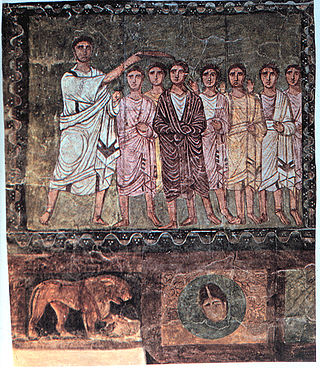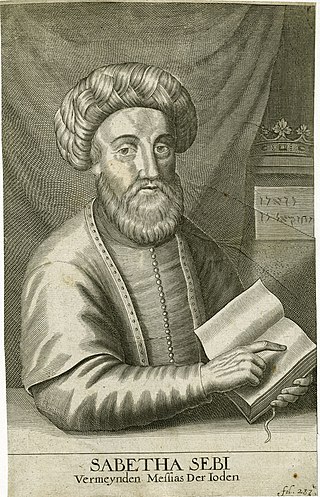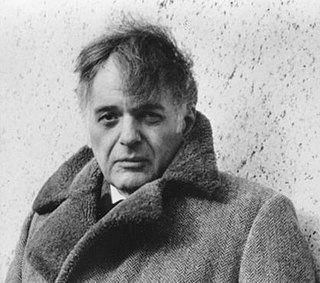Related Research Articles

In Abrahamic religions, a messiah or messias is a saviour or liberator of a group of people. The concepts of mashiach, messianism, and of a Messianic Age originated in Judaism, and in the Hebrew Bible, in which a mashiach is a king or High Priest traditionally anointed with holy anointing oil.

The Sabbateans were a variety of Jewish followers, disciples, and believers in Sabbatai Zevi (1626–1676), an Ottoman Jewish rabbi and Kabbalist who was proclaimed to be the Jewish Messiah in 1666 by Nathan of Gaza.

Jacob Joseph Frank was a Polish-Jewish religious leader who claimed to be the reincarnation of the self-proclaimed messiah Sabbatai Zevi (1626–1676) and also of the biblical patriarch Jacob. The Jewish authorities in Poland excommunicated Frank and his followers due to his heretical doctrines that included deification of himself as a part of a trinity and other controversial concepts such as neo-Carpocratian "purification through transgression".

The Messiah in Judaism is a savior and liberator figure in Jewish eschatology who is believed to be the future redeemer of the Jews. The concept of messianism originated in Judaism, and in the Hebrew Bible a messiah is a king or High Priest of Israel traditionally anointed with holy anointing oil.
Messianism is the belief in the advent of a messiah who acts as the savior of a group of people. Messianism originated as a Zoroastrian religious belief and followed to Abrahamic religions, but other religions also have messianism-related concepts. Religions with a messiah concept include Hinduism (Kalki) Judaism (Mashiach), Christianity (Christ), Islam, Druze faith, Zoroastrianism (Saoshyant), Buddhism (Maitreya), Taoism, and Bábism.
Jehuda Reinharz served as President of Brandeis University from 1994–2010. He was the Richard Koret Professor of Modern Jewish History and Director of the Tauber Institute for the Study of European Jewry at Brandeis. He is the president and CEO of the Jack, Joseph and Morton Mandel Foundation. On September 25, 2009, Reinharz announced his retirement as President of Brandeis, but at the request of the Board of Trustees, he stayed on until a replacement could be hired. On January 1, 2011, Reinharz became president and CEO of the Jack, Joseph, and Morton Mandel Foundation.
The Epistle to Yemen or Yemen Letter was an important communication written by Maimonides and sent to the Yemenite Jews. The epistle was written in 1173/4. The letter was written in Arabic.
Martin David Goodman, FBA is a British historian and academic, specialising in Roman history and the history and literature of the Jews in the Roman period.
David Berger is an American academic, dean of Yeshiva University's Bernard Revel Graduate School of Jewish Studies, as well as chair of Yeshiva College's Jewish Studies department. He is the author of various books and essays on medieval Jewish apologetics and polemics, as well as having edited the modern critical edition of the medieval polemic text Nizzahon Vetus. Outside academic circles he is best known for The Rebbe, the Messiah, and the Scandal of Orthodox Indifference, a criticism of Chabad messianism.

Judah ben Shalom, also known as Mori (Master) Shooker Kohail II or Shukr Kuhayl II, was a Yemenite messianic claimant of the mid-19th century.

Frankism is a Sabbatean religious movement of the 18th and 19th centuries, created in Podolia, named after its founder, Jacob Frank. Frank completely rejected Jewish norms, preaching to his followers that they were obligated to transgress moral boundaries. At its height Frankism claimed perhaps 50,000 followers, primarily Jews living in the Polish–Lithuanian Commonwealth, as well as in Central and Eastern Europe.

Messianism in Chabad refers to the belief within the Chabad-Lubavitch community—a prominent group within Hasidic Judaism—regarding the Jewish messiah. Central to this belief is the conviction that Rabbi Menachem Mendel Schneerson, the seventh Rebbe of the Chabad-Lubavitch dynasty, is the awaited Messiah who is leading the Jewish people into the Messianic era.

Yosef Hayim Yerushalmi was the Salo Wittmayer Baron Professor of Jewish History, Culture and Society at Columbia University, a position he held from 1980 to 2008.

Gabriel's Revelation, also called Hazon Gabriel or the Jeselsohn Stone, is a stone tablet with 87 lines of Hebrew text written in ink, containing a collection of short prophecies written in the first person. It is dated to the late 1st century BCE or early 1st century CE and is important for understanding Jewish messianic expectations in the Second Temple period.

The Sacred Scriptures Bethel Edition (SSBE) is a Sacred Name Bible which uses the names Yahweh and Yahshua in both the Old and New Testaments. It was produced by Jacob O. Meyer, based on the American Standard Version of 1901 and it contains over 977 pages. The Assemblies of Yahweh printed 5,500 copies of the first edition in 1981. It is also used by some members of the Sacred Name Movement.
Isaiah 2 is the second chapter of the Book of Isaiah in the Hebrew Bible or the Old Testament of the Christian Bible. This book contains the prophecies attributed to the prophet Isaiah, and is one of the Books of the Prophets.
Isaiah 9 is the ninth chapter of the Book of Isaiah in the Hebrew Bible or the Old Testament of the Christian Bible. This book contains the prophecies attributed to the prophet Isaiah, and is one of the Nevi'im.
Isaiah 11 is the eleventh chapter of the Book of Isaiah in the Hebrew Bible or the Old Testament of the Christian Bible. This book contains prophesies attributed to the prophet Isaiah. This chapter can be divided into two main parts, verses 1–9 and verses 11–16, with verse 10 as a connecting statement between them. The New International Version entitles the chapter "The Branch from Jesse".

Yehuda Liebes is an Israeli academic and scholar. He is the Gershom Scholem Professor Emeritus of Kabbalah at the Hebrew University of Jerusalem. Considered a leading scholar of Kabbalah, his research interests also include Jewish myth, Sabbateanism, and the links between Judaism and ancient Greek religion, Christianity, and Islam. He is the recipient of the 1997 Bialik Prize, the 1999 Gershom Scholem Prize for Kabbalah Research, the 2006 EMET Prize for Art, Science and Culture, and the 2017 Israel Prize in Jewish thought.
References
- Notes
- ↑ "Jacob Frank". britannica.com. Retrieved 23 October 2010.
- 1 2 3 "Harris Lenowitz". University of Utah. 2009. Archived from the original on 2016-03-03. Retrieved 23 October 2010.
- ↑ "The Collection of the Words of the Lord [Jacob Frank] from the Polish manuscripts". University of Utah. 2004. Archived from the original on 20 June 2011. Retrieved 23 October 2010.
- ↑ "The Collection of the Words of the Lord Jacob Frank". 10 March 2001. Retrieved 23 October 2010.
- 1 2 "The Jewish Messiahs: From the Galilee to Crown Heights". Oxford University Press. Retrieved 23 October 2010.
- ↑ Walton, Michael (1999). "The Jewish Messiahs (book review)". The Sixteenth Century Journal. 30 (3): 868–9. doi:10.2307/2544861. JSTOR 2544861.
- 1 2 3 Koepp, Paul (13 August 2010). "University of Utah's Middle East Center Loses Prestigious Grant". Deseret News. Archived from the original on October 21, 2012. Retrieved 23 October 2010.
- ↑ Maffley, Brian (9 April 2009). "U. Humanities Dean Accused of Defaming Prof". The Salt Lake Tribune . Retrieved 23 October 2010.